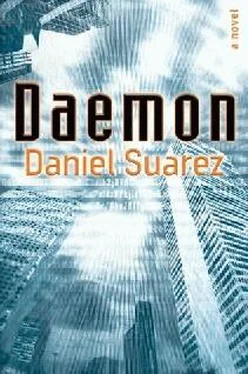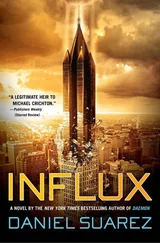Leland bankers told clients that they didn’t design the world—they were just trying to live in it. And incidentally, the wonders of the developed world rose from the ashes of conflict and competition, so they were helping people in the long run. For godsakes, just look at Japan.
And while the debate mumbled on, asterisked by legal disclaimers, Leland booked another highly profitable year.
But profitability was not what was bothering Garrett Lindhurst as he approached the CEO’s office suite.
Among Leland’s C-level executives, only Lindhurst was without decades-old family ties to the organization—but then again, the rapid expansion of computer systems in the corporate world in recent years had outpaced the ability of old-money families to produce senior technology talent. While Lindhurst hadn’t written any actual code since working with Fortran and Pascal back in his Princeton days, he had learned over the years how much systems should cost and what they needed to do.
In essence, computer systems needed to do only one of two things: make money or save money. Everything else was just details. Scut work. These tasks Lindhurst delegated to the executive senior veeps, who, in turn, delegated them to someone else…and so on. It was only during times of complete disaster that Lindhurst involved himself with the actual computer systems themselves.
Today was such a time.
Lindhurst pointed at the CEO’s temple-like office doors as he passed the executive secretary’s desk. “He in?”
“He’s leaving for Moscow in an hour.”
She barely registered Lindhurst’s presence. A stone-faced woman in her fifties, she was many years in the CEO’s service and effectively had more authority than any two senior vice presidents put together.
But Lindhurst had more authority than ten. He pushed his way through the towering double doors.
“Garrett!” she called after him.
He ignored her and proceeded into the CEO’s cavernous office at a quick pace.
The tanned, pampered face of Russell Vanowen, Jr., CEO and chairman of Leland Equity Group, looked up from reading a letter. He scowled. “Damnit, Garrett, make an appointment.”
Garrett heard the doors close behind him, and he took a deep breath. “This can’t wait.”
“Then just pick up the phone, for chrissakes.”
“We need a face-to-face.”
Vanowen regarded him like a statue would a pigeon. Vanowen had that obsessively groomed look of the fabulously rich—as though his head were the grounds of Augusta National and a hundred grounds-keepers swarmed over it each morning. The ring of white hair sweeping around the back of his head was perfectly manicured like a green. The pores of his skin were flawless. His suit was masterfully tailored to make his husky form look manly and authoritative.
Yet, for all his obvious fastidiousness, Vanowen did not look soft. He was stocky, intimidating, with a presence that projected itself without having to speak; his eyes scanned a room like twin .50-caliber machine guns. And he had an almost mystical authority in this office, with its bank of tall windows overlooking downtown Chicago and Lake Michigan beyond. This was a fabled seat of power, overlooking the length and breadth of the land.
Lindhurst proceeded toward Vanowen’s massive teak wood desk, still thirty feet away. “We have a major problem, Russ.”
Vanowen still held a letter in one hand, glaring over his reading glasses. He reluctantly dropped the letter on his otherwise empty desk and removed his glasses. “When you say ‘we,’ I take that to mean ‘you.’” He glanced at his massive watch, tugging a cuff-linked sleeve up to see the face. “I’m heading out to the airfield any minute.”
There wasn’t any time to finesse it. “We’ve lost administrator rights to our network.”
This did not have the impact Lindhurst hoped.
Vanowen shrugged slightly and now looked greatly irritated. “So what the hell do you want me to do about it? You’re the CIO; ride your people until they fix it. Jesus, Garrett.”
Lindhurst sat down in one of the uncomfortable leather chairs, pulling it right up to the desk. He leaned in close, still clutching the rolled magazine. “Russ, listen to me: we don’t have any control over our databases.”
“My response is the same. Now would you let me read this letter, please?”
“WE ARE UNDER ATTACK.”
That got Vanowen’s attention. “Attack?”
“Attack. All offices, worldwide. Look, I get in this morning, and I have phone calls from six division heads telling me they can’t log on as admins to our servers. They think it’s a layoff and that they’ve been shut out on purpose.”
“Were they?”
“Not by us. Turns out no one can get an admin logon—not even here in the main office. All systems rebooted last night. And somehow, somebody took over our network. We have only limited rights to it.”
Now Vanowen looked really angry. He pounded his fist on the desk. “Jesus Christ, Lindhurst! Why the hell wasn’t I told about this sooner? Our clients must be screaming bloody murder.”
“Hold on a second. Our Web sites are up, and we can access data, no problem. So can our clients. We can even change data, so no one outside Leland knows yet.”
Confused and getting angrier by the moment, Vanowen gestured, “So what’s the problem?”
“The problem is that we can’t back up, restore, or change our servers. We can’t even export data.”
“I may not know much about this stuff, Lindhurst, but I do know we spent thirty million dollars on backup systems. Surely you can take a backup copy and restore it.”
“That’s just it; our backup SANs are toast. Our off-site replication trashed. The log files were faked. We have no backups newer than four months ago.”
Vanowen squinted at him. “How is that possible? I spent forty-seven million dollars on IT last year alone. We were supposed to have the most advanced network security money can buy. You assured me of that. You assured the board of that. That’s why we hired you.”
“I don’t think our systems were breached. Not from the outside. I think it’s an inside job.”
“Call the FBI.”
“We can’t do that.”
“The hell we can’t.”
“Understand this, Russ: they can flush our entire network down the toilet with a single keystroke—from just about anywhere in the world. This company is hanging by a thread.”
The room got deathly quiet. Still staring, Vanowen spoke with the sort of calm voice that usually precedes violence. “Explain this to me, Garrett.”
“It gets much worse.”
“Worse? How the hell can it get any worse?”
“Watch.” Garrett motioned for Vanowen to follow him.
Vanowen’s office was huge, with a double-height ceiling and windows. Several sets of sofas and leather chairs were placed about the room, with a wide plasma-screen television on the far end and a conference table nearby, encircled by chairs. The place was easily a couple thousand square feet.
Vanowen reluctantly got up from his desk and followed Lindhurst to the plasma screen. Lindhurst was already fiddling with a remote he had picked up from the credenza there.
Vanowen settled into a conference table chair. “I’ll see that the people behind this go to federal prison for the rest of their lives.”
“I don’t think so.”
“What the hell’s that supposed to mean?”
“You’ll see in a moment.” Lindhurst gestured to the plasma screen. “Have you used this video conferencing system yet? It cost seventy thousand dollars.”
“Goddamnit, Lindhurst—”
“Okay, look, this system is jacked into our corporate network. I put something out there that I want you to see.” Lindhurst used the remote to navigate to an intranet Web page, which filled the screen. “I found an e-mail in my inbox this morning. It was from the system administrator—the new system administrator. The person who took my rights away. That e-mail contained a hyperlink—which I copied to this network share.” He navigated to another page and clicked a hyperlink. “Here is what I saw….”
Читать дальше












